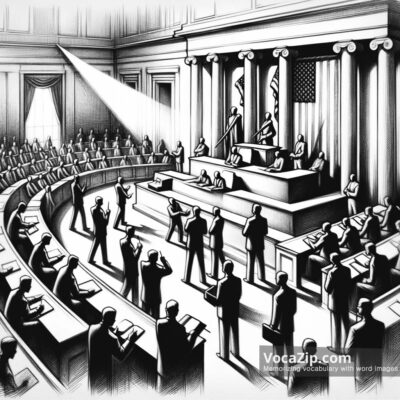legislation meaning
legislation :
laws, rules
noun
▪ The government passed new legislation.
▪ The government made new laws.
▪ The legislation will take effect next year.
▪ The laws will start next year.
paraphrasing
▪ act – laws
▪ statute – rules
▪ regulation – rules
▪ ordinance – local laws

Pronunciation
legislation [ˌledʒ.ɪˈsleɪ.ʃən]
The stress is on 'sla' and sounds like 'lej-i-slay-shun'.
Common phrases and grammar about legislation
legislation - Common meaning
noun
laws, rules
Part of Speech Changes for "legislation"
▪ legislate (verb) – to make laws
▪ legislative (adjective) – related to making laws
▪ legislature (noun) – the group that makes laws
▪ legitimate (adjective) – lawful, according to the law
Common Expressions with "legislation"
▪ pass legislation – to make new laws
▪ propose legislation – to suggest new laws
▪ new legislation – recently made laws
▪ enforce legislation – to make people follow laws
Important examples of legislation in TOEIC
Vocabulary examples from the TOEIC test
In TOEIC vocabulary questions, legislation usually refers to a set of laws or legal rules.
Example of a confusing word: litigation (legal proceedings)
Grammar examples from the TOEIC test
In TOEIC grammar questions, legislation is used as a noun and often takes adjectives or determiners in sentences.
legislation
Idioms and fixed expressions in TOEIC
pass legislation
'make new laws', used when discussing the creation of laws.
Differences between similar words and legislation
legislation
,
law
differences
legislation refers to the process of making laws or the set of laws, while law refers to rules that are enforceable by a governing authority.
legislation
,
regulation
differences
legislation refers to laws passed by a legislative body, while regulation refers to specific rules made by the executive branch or agencies based on the laws.
Words with the same origin as legislation
The origin of legislation
legislation comes from the Latin 'legislatio', which means 'the action of making laws'.
Word structure
It has the prefix 'legis' (law), root 'lat' (propose), and suffix 'ion' (noun), so legislation means 'the act of making laws'.
Words with the same origin
The root of legislation is 'legis' (law). Words with the same root include 'legislate', 'legislature', 'legislative', 'legitimate'.
Please select an image in the quiz
Previous post and next post


legislation
1925
laws, rules
noun ┃
Views 4






